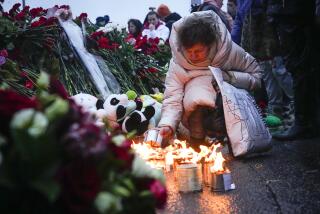Coup Fears Seem to Ease in Montenegro, but Bombs End Calm
- Share via
PODGORICA, Yugoslavia — Political tensions and fears of a possible coup seemed to ease here Tuesday, but shortly before midnight the calm was broken by renewal of NATO airstrikes on military targets in Montenegro.
Air raid sirens wailed at 7:22 p.m., just before the end of an anti-NATO outdoor rock concert in the city’s central square. But citizens ignored the sirens, which routinely go off when attack planes fly over Montenegro to strike targets in Serbia. Until Tuesday, Montenegro had not been hit for nearly a week.
Several hours after the sirens sounded, a loud boom shook the city. A few minutes later, a flash of light could be seen roughly in the direction of the Podgorica airport, in an area where Yugoslav army troops and equipment have been stationed. Serbia and Montenegro together form Yugoslavia, and the country’s 2nd Army is stationed here.
About an hour after the bombs fell, Montenegrin state-run television showed video footage of a fire burning in a lightly wooded area near the Smokovac Bridge, about 10 miles north of Podgorica. It was not clear what the target may have been.
The same station later reported that it had learned unofficially that two “huge explosions” shook the region near the Adriatic Coast port city of Bar. Radar installations on the coast were hit in the first days of North Atlantic Treaty Organization bombing.
Some bomb fragments--the biggest about 5 feet long--fell near downtown Podgorica. Rounds of antiaircraft fire lighted the night sky while the attack was underway.
The renewed attacks appear to mark a severe setback for democratic-minded Montenegrin President Milo Djukanovic. Generally seen as the most significant political opponent within Yugoslavia to President Slobodan Milosevic, Djukanovic has tried to distance his republic as much as possible from NATO’s clash with the government in Belgrade, the Yugoslav and Serbian capital.
Just hours before Tuesday’s attack, many in the city were relieved that a series of anti-NATO concerts had ended without public disturbances. Some said the peaceful atmosphere was due in part to the week’s absence of bombings here.
“The situation is still dangerous, but the tensions are going down day by day,” Milorad Jovovic, secretary-general of the Montenegrin Foreign Ministry, said Tuesday afternoon.
“We are about seven days without bombs on Montenegro,” Jovovic said. “Every bomb that fell on Montenegrin ground increased tensions here. Now I think people realized that the approach of the Montenegrin government--for stability, and to obtain as little damage as possible--is the right one.”
Tuesday’s concert was the third in a series that began Sunday. The rhetoric of speakers at the first concert was hard-edged and angry, but Tuesday’s festival called for peace and love.
“Student associations are organizing a great musical spectacle, Song of Peace Against the War,” declared posters put up around this capital to advertise the final musical rally. “Peace, wisdom, love and tolerance have to win.”
The concerts were originally planned by groups that back Milosevic and bitterly oppose Djukanovic. There had been widespread fears in the Montenegrin government that provocateurs might trigger violence at the events and provide a pretext for a coup backed by the Yugoslav army.
But amid intense discussions among rival Montenegrin political groups, control of the final concert passed to a new, nonpartisan student association that called for “all the citizens of Montenegro to maintain common sense, tolerance and to help maintain civil peace.”
“You probably have noticed that tension was greater in the first rally,” said Slobodan Jaramaz, 46, an electronics technician who came partly to express opposition to the NATO bombing of Yugoslavia but mainly to check out whether pro- or anti-Djukanovic forces seemed to be getting the upper hand here in Montenegro. His conclusion was that the tide was shifting toward Djukanovic.
“It’s still not clear who is winning, but it seems the tendency has changed,” Jaramaz said. “A moment ago, I saw people from different parties all together--the [pro-Milosevic] SNP, [Djukanovic’s ruling] DPS and the [moderate] national party. That was impossible before, but now it’s happened. I do believe they have a mutual decision to keep the situation in balance.”
Jaramaz said he believes that pro- and anti-Milosevic groups are willing to struggle against each other politically in Montenegro but do not want to be drawn into a coup or civil war in which rival political groups start killing each other. He noted that during World War II there had been much bloodletting among Montenegrins, and added: “I believe we’ve drawn some conclusions from our historical experiences.”
Speeches were rare at Tuesday’s event, and most political opinions were expressed in posters held aloft in the crowd. One used the Montenegrin phrase “Second Condition”--meaning pregnancy--to produce a local equivalent of the 1960s anti-Vietnam War slogan “Make Love, Not War.” The poster, held by a young couple, declared: “Better Second Condition than War Condition.”
Some posters were more bitter. “Bomb Shelters Are Not Our Home,” said one. “Cowboys Dismount,” said another.
More to Read
Sign up for Essential California
The most important California stories and recommendations in your inbox every morning.
You may occasionally receive promotional content from the Los Angeles Times.










